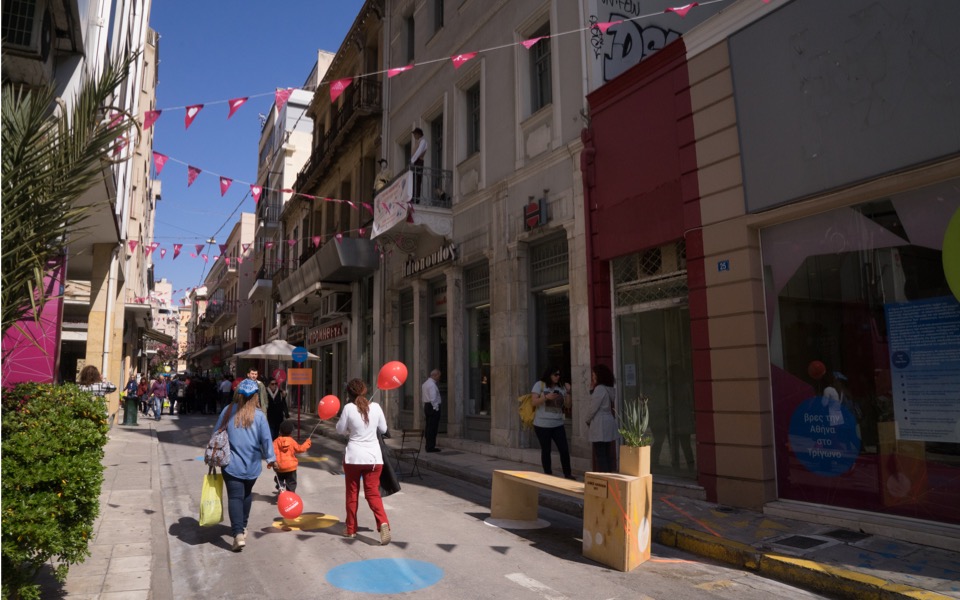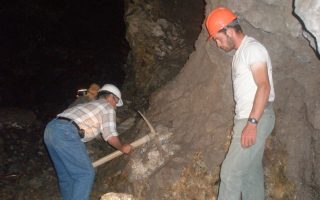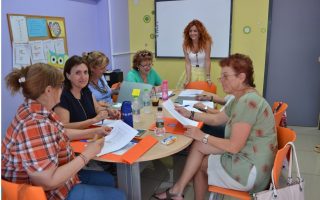The revival of the capital’s commercial triangle

A pilot program called “The Triangle” has resulted in a sea change in relations between the municipality and shop owners in Athens’s “commercial triangle,” as the capital’s central retail district is known, resulting in an effective coexistence in a city that’s difficult at the best of times but which is going through an especially hard time now.
The Triangle was launched last year with funding from the Stavros Niarchos Foundation. It has since yielded tangible results. In the area, Athinas, Evripidou, Pericleous, Athinaidos and Aghias Eirinis streets are gradually being pedestrianized. Building facades, some of which are considered architectural treasures, are being rid of layers of spray paint and posters, and covered with anti-graffiti and hydrophobic coatings. City Hall has partnered up with chemicals company Booka for this specific task.
In order to improve the lack of green space in Athens, potted plants have been placed outside of shops, along with benches, chairs and tables, inviting the public to stop and look around. Twelve telecom cable terminals have been decorated by artists. The area’s lighting has also been improved with the installation of 3,040 street lamps – although at the same time the rest of the municipality of Athens has been waiting on the approval of 50,000 street lamps for two years now.
The local economy
“Anything we need either for the area or even for our offices, we get it from the local market in order to strengthen the local economy. We flow like a slow river,” says Elina Dalla, project manager for The Triangle. She also served as the the City of Athens’s chief operating officer during the 2004 Olympic Games.
We met with Elina one blazing hot afternoon when the Attic light brought both the ugliness and beauty of this city into sharp focus. She submits monthly reports to the Stavros Niarchos Foundation and every Sunday brings Mayor Giorgos Kaminis up to date on the project’s progress on the telephone. Most importantly, though, she responds daily to requests, complaints and praise from the area’s business owners. At the same time, she wants to encourage the city’s residents to utilize buildings that today stand empty.
The original vision for the commercial triangle was born out of a desire to make more public space with fewer vehicles. Its strategy was based on two major studies conducted by The Triangle that used a sample of 1,500 of the area’s visitors and over 100 business owners. The studies found that 71 percent of the visitors said they would go to the district more frequently if there were more common areas to sit. More than half (57.5 percent) said they wanted the area to be cleaner, with less graffiti on the walls, while a similar number (56 percent) said they wanted more pedestrian space.
Among business owners, 68.3 percent identified illegal parking and idling vehicles to be a major problem and two-thirds criticized the lack of policing. Improving street lighting was seen as a priority for 65 percent while 53.3 percent also underscored that they want to see cleaner streets. These are all issues the Triangle project is working to fix. A monthly update on the project’s progress comes in the form of pamphlets and newsletters for those who live and work in the district and these are made available for visitors to see as well.
Many of the area streets had been gradually pedestrianized between 1978 and 2001, but the regulation simply hasn’t been enforced. “The legal framework was already there – we just activated it,” said Elina. “We activated the pedestrianization of Vissis and Kairi streets in April of this year, Karori and Agathonos in May, and in June Chrisospiliotissis, Nikiou and Miltiadou streets joined their ranks.”
Dalla and her colleagues come up against red tape and slow service on the part of the city and the public sector every day. “You must be ready to deal with so many different attitudes and reactions from people.” That is how Panagiotis Perimenis, who works with the Triangle project, describes it. Panagiotis is the go-to person for the business owners and tries to keep everyone involved up to speed.
A local business owner says he changed his mind three times about whether or not he’d like to take part in the pilot program. “I was hesitant when they first came to ask me if they could ‘restore’ – as they described it – the front of my shop and put a potted plant outside. What would you have thought if you were in my position? Later, I said: ‘Why not try it? What do I have to lose?’ Then I said, ‘Oh why should I get caught up in this?’ But now I’ve finally seen the improvements in front of me and embraced the potted plant as my own!” he says emphatically.
Many stories
Elina says she’s heard numerous similar stories. “A shop owner near Karamanou Square where Vissis and Athinas streets meet doesn’t want their establishment to suddenly have two dolls made by an artist or an event we organized in front of it. Today the artist goes there every month and changes the dolls’ clothes. The mayor and I have a goal to create a model to understand Athens through the promotion of its wealth of craft, history and gastronomy, by creating more public space, more green space, and renewing urban infrastructure. Above all, to engage citizens.”
Of course, in a city like Athens, where one side of a road may belong to the municipality and the other to a ministry, things are especially complicated. So imagine acting as the go-between with all parties involved and the water company as the latter goes about changing the outdated sewage system for Aiolou Street. “It appears everything from the sky down to the earth ends up in the same drainage pipe, which is why Aiolou Street stinks,” Elina sighs.





